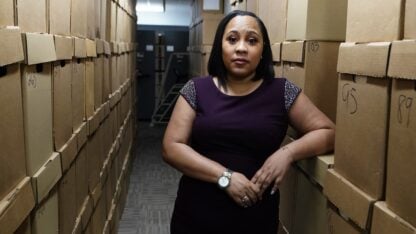Atlanta Mayoral Candidate Kenny Hill Answers 6 Questions On The Environment
WABE sent questions about environmental issues to all of the mayoral candidates. The questions cover climate change and extreme heat, water resources, park maintenance, the tree ordinance and lead contamination in West Atlanta neighborhoods.
The questions are in bold, and Kenny Hill‘s answers follow. Answers were edited for clarity and content.
The U.S. Environmental Protection Agency recently expanded the area in English Avenue and Vine City where properties may need to have their soil completely removed and replaced, after finding dangerous levels of lead in people’s yards.
What role do you think the City of Atlanta should have in engaging with the community, and what is your plan to address this potential children’s health issue in West Atlanta neighborhoods?
The health and safety of the citizens of Atlanta is at the top of my list of priorities. Engaging with the community, as mayor I intend to address the lead issue in the West Atlanta neighborhoods. The USEPA has been remediating or addressing the issue by removing and replacing the contaminated soil, at no financial cost to the homeowners. USEPA has scheduled a public meeting for October 7, 2021, and is presently soliciting public comments on the proposed listing of the site as a National Priorities Superfund Site (NPL), with written public comments being solicited, ending on November 8, 2021. As USEPA has commented: “Adding the site to the NPL will allow EPA to continue to determine which yards are impacted by lead and conduct the necessary soil cleanup at the affected properties.”
However, the physical and mental cost of this problem can far outweigh financial the cost of removing the lead. Furthermore, it is important to ensure that the USEPA and other authorities determine the full extent of the lead problem. What concerns me most is the exposure to the residents of the Westside, especially the young children, who are more susceptible to lead contamination. The key steps which I will take are:
- Work closely with the USEPA and Georgia Environmental Protection Division (GEPD) to promote prompt and thorough resolution of the issue
- Participate in and promote efforts to ensure that the Westside is listed and identified as part of the EPA’s Superfund program’s National Priorities List (NPL). The NPL is a priority list of hazardous waste sites eligible for cleanup funds.
- Timely educating the citizens concerning the USEPA process and progress, such as funding for cleanup and free-soil testing for lead contamination, and steps your family can take to reduce their exposure
- Ensure that certain city staff are appropriately trained regarding environmental justice issues, to better serve the needs of all communities
- Continue to promote Fulton County Board of Health’s blood level lead testing programs
While Atlanta has some big, beautiful new parks opening now and coming soon, many city parks need maintenance. According to the Park Department’s long-term planning program, Atlantans said the number one thing discouraging them from using their parks was that they were not well maintained.
How would you ensure that parks — whether they’re new or old, big or small, regardless of the neighborhood — get adequate funding and maintenance? And how would you involve communities in decisions about their parks?
Historically, when cities experience budget crunches one the first items on the chopping block are park and recreational spending. I have long disagreed with that practice. I believe nice clean safe parks encourage citizens to take pride in their city and it keeps children off the streets. As mayor, I will expend funds to maintain parks.
In addition, I will seek to do what I did with my nonprofit organization, Launch Pad Foundation, by encouraging those in the community to contribute their time to clean up their neighborhood. It can easily be extended to parks. Clean the park weekend with the city providing the trash bags and maintenance equipment. This not only will get the parks clean it will give the citizen a vested interest in the parks. It belongs to them; they paid for it through their taxes. They will take a role in discouraging those that would seek to trash the parks.
I would have citizens call 311 to report problems in their parks. Committing to respond to complaints with 48 hours.
I would involve the communities in decisions about their parks by having the Parks director not make major decisions regarding parks without neighborhood meetings open to the community to get their input.
Moreover, aside from their aesthetic value, trees help fight climate change. Most parks contain trees, which in their growth, help arrest climate change by removing carbon dioxide from the air and releasing oxygen into the atmosphere.
Atlanta is losing its tree canopy, and the city has taken years to finish a promised re-write of the tree protection ordinance.
How would you make sure the ordinance update is completed, and ensure that it is enforced?
From what I have read in the Atlanta Journal-Constitution, the city council in March 2020 had been considering the revision of the ordinance making it more difficult to cut certain trees. I am not privy to why the new policy has not been rolled out. I am in general agreement with the parameters of the new policy and will seek to determine why it has not been made law and rolled out. As stated in my response to the Parks issue trees are factors in combating global warming and reduction of carbon dioxide.
Atlanta is hot and getting hotter. Often the hottest neighborhoods are in vulnerable communities of color. Atlanta also has many households with high energy burdens that pay a high proportion of their income to energy bills. Not everyone can afford to run the air conditioner all summer or afford efficiency upgrades to keep their homes cooler — and heat can be dangerous.
What role do you see for the mayor’s office in addressing the health risks of extreme heat?
The mayor’s office should play a role in addressing the health risk of extreme heat on the citizens of Atlanta. Especially to vulnerable populations. We should provide cooling centers during the hottest portion of the day and also provide fans to those in need of them. Establish grant money to provide for those needing assistance in paying their power bill during warmer months.
Georgia Low-Income Home Energy Assistance Program is a federally-funded program that helps low-income households with their home energy bills. This can reduce the risk of health and safety problems. The city of Atlanta can assist the citizen in connecting with the federal program or supplement the program when needed.
To address climate change, the City of Atlanta prepared a climate action plan in 2015 on how to cut emissions. The city also made a commitment to achieve 100% clean energy by 2035. But progress towards that goal has been slow.
What, if anything, would you do to keep Atlanta moving towards emissions reductions? And how would you prepare Atlanta communities to weather the effects of climate change, which include extreme heat, increased flooding, mosquito-borne disease and worsening air quality?
Climate change is a serious problem, and all Americans are impacted by it. Simply, consider the drastic weather changes and calamities over the last few years. This is evidenced, for example, in warm climates by increases in temperature, stagnant air, drought, mosquitoes, heatwave days, increases in ground-level ozone, and risk of inland flooding, all of which contribute to a less healthy environment. Nevertheless, some locales bear a greater than the normal brunt of the impact than others. Atlanta is one of those “greater than normal impact” locations. It ranks as the 19th fastest-warming city in the country. Additionally, it is 2 degrees hotter than in nearby rural areas and nearly 4 degrees warmer at night than in rural areas.
Among other solutions, we should consider the following: (a) install solar systems on public buildings (b) commit to increases in renewable energy (c) create municipal energy efficiency, and encourage the same in non-government buildings, including smart system control technologies, efficient lighting and daylighting; (d) promote fewer car miles and greater public transportation; and (e) support (economically and informationally) energy efficiency in disadvantaged households.
Unfortunately, the issues of heat and climate change are inextricably linked. Summers are getting hotter in Georgia as the dewpoint temperature rises, with the state averaging about 20 extreme heat days a year, with the elderly, sick, and poor being disproportionately impacted. This is a serious problem because high air temperatures can cause heatstroke and dehydration and affect people’s cardiovascular and nervous systems. It is even more serious in Atlanta because it creates an “urban heat island”. On a broader basis, unless we address climate change, fossil fuels, and energy efficiency, Atlanta will be locked into issues of extreme heat, as noted in my answer to your question related to climate change. To further address this issue, I will:
- Work with our legislators in Congress to ensure that the Build Back Better legislation is enacted at the federal level, since it expands the use of clean energy, like solar and wind, and includes environmental justice provisions that target communities affected by pollution/development and climate change
- Establish a climate change adaptation plan for the city, integrating heat problems with public health planning
- Update and revise the city’s 2015 Climate Action Plan
- Ensure that cooling stations are established or converted in areas of the city where the most vulnerable populations are located, paying heed to the days or periods which are most likely to generate the greatest heat
- Partnership with community health organizations and the fire department to have at least one health professional man these stations to monitor the health of those inside
- Continue the city’s efforts with the various non-governmental actors, such as SPARCC and TFA
Georgia won a major legal victory in the water wars in the U.S. Supreme Court earlier this year, but there is still another case ongoing. And, Florida, Georgia and Alabama have not found a resolution between themselves. Metro Atlanta is subjected to both floods and droughts — both of which climate change will likely worsen — and we must share our limited water supply within the region and with downstream neighbors.
As the mayor of Atlanta, how would you see your role in addressing and preparing for the region’s water challenges?
Atlanta, unlike most large cities, lacks access to a large river system. Its primary water source is surface water from Lake Lanier in the Apalachicola-Chattahoochee-Flint River Basin. Contributing to the building water crisis is an increase in demand for water due to Atlanta population growth, frequent droughts and inadequate government policies.
There is no quick and easy answer to the complex water shortage problem, The United Nations endorsed projections estimate that in just ten years, global demand for water will outstrip supply by 40 percent. So, we are not alone in this crisis. The time for action is now, tomorrow may be too late.
I would seek to bring all stakeholders together to get impute from all affected parties. Atlanta’s water problem is larger than our borders and must include all those in our region to come together in an attempt to find a united solution. But immediately I would seek to do the following:
- Improve water infrastructure- trillions of gallons of clean water are lost each year due to failing infrastructure
- Reduce water pollution- reduce industry and individuals from dumping toxic substances
- Institute Intense education program- educating our youth about how important water is to our survival and what they can do to preserve it
- Institute Intense public relations campaign – encouraging all in the Atlanta region to do their part in reducing water consumption
- Encourage Industrial water conservation – such as manufacturers and utilities reusing their water, and offering incentives to industries who reduce water consumption
- Encourage individual water conservation- such as installing water-saving fixtures and appliances, eliminating water leaks
I would also, recommend investing in innovative technologies like rainwater harvesting, solar and UV water filtration. Other cities have used innovative technological methods to attack their water shortage problems that may be instructive, as well. The city of Los Angeles, California deployed 96 million shade balls into the Los Angeles Reservoir. These small black balls covered the surface of the water, which provided shade and slowed evaporation. Singapore a small city-state of five million used a waste recycling program to attack its water crisis. They used a four-step reverse osmosis process which removed contaminants and toxins transforming the sewer water into clean water.
Read answers from other candidates.








